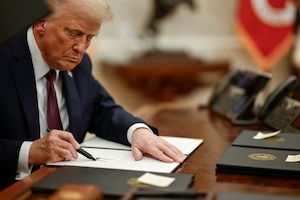Trump Announces 40 Executive Orders, Officially Renaming the Gulf of Mexico to Gulf of America

On the 20th, upon taking office, Trump issued an executive order to officially rename the internationally recognized Gulf of Mexico as the "Gulf of America" and instructed the Department of the Interior to take "all necessary actions" within 30 days to push for the official rebranding, sparking controversy.
The Gulf of Mexico is crucial to America's rise as a superpower, particularly in terms of oil and natural gas reserves. It not only strengthens the United States' commercial and political ties with Latin American countries, but also provides a natural barrier, protecting the country from invasions and conflicts. According to the U.S. Energy Information Administration (EIA), the Gulf of Mexico accounts for 17% of the total U.S. oil production, making it critical for American energy independence. Additionally, the Gulf is an important hub for global maritime trade, with 60% of U.S. grain exports passing through its ports, amounting to 30 million tons annually.
Under the United Nations Convention on the Law of the Sea (UNCLOS), countries have exclusive rights to exploit resources in their exclusive economic zones. Mexico has jurisdiction over 829,000 square kilometers of the Gulf, while the U.S. controls 662,000 square kilometers. These territorial boundaries have long been clearly defined and are protected by international law. Although Trump's "Gulf of America" renaming initiative carries significant political symbolism, in practical terms, the U.S. would face multiple legal, diplomatic, and economic challenges.
Former Mexican Ambassador to the U.S., Martha Barcena, warned that Trump's move to rename the Gulf might be the first step in the U.S. attempting to reallocate the Gulf's resource domains, which would undoubtedly draw opposition from both Mexico and the international community. Several international law scholars also pointed out that if the "Gulf of America" becomes a reality, it could have profound implications for oil and natural gas extraction in the region, global energy markets, and international trade, potentially even altering the political dynamics of the area.
- 114 reads
Human Rights
Fostering a More Humane World: The 28th Eurasian Economic Summi

Conscience, Hope, and Action: Keys to Global Peace and Sustainability

Ringing FOWPAL’s Peace Bell for the World:Nobel Peace Prize Laureates’ Visions and Actions

Protecting the World’s Cultural Diversity for a Sustainable Future

Puppet Show I International Friendship Day 2020

